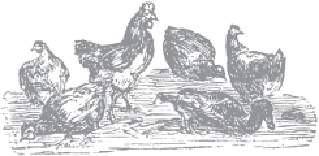Agriculture Reference
In-Depth Information
25
Flock Health
KEEPING YOUR FLOCK HEALTHY
requires a two-pronged approach. Raisers must focus on
both ongoing health maintenance and treatment of illnesses and injury. Maintenance is
a proactive matter of properly feeding your birds to keep them well; keeping them safe
from predators and weather extremes; selecting healthy, diverse birds for traits such as
hardiness and disease resistance; testing them periodically for evidence of the more debil-
itating diseases; and cleaning their living quarters and equipment regularly. These meas-
ures all amount to prevention.
Some folks also choose to vaccinate their birds and give antibiotics in feed as a pre-
ventive measure. I never vaccinate and I give antibiotics only as a last resort. I focus in-
stead on wellness: selecting breeders for disease resistance, a balanced feeding system
that includes pasture range, lots of exercise, and close personal attention to my flocks.
This method has served me and my poultry well.
The reactive aspect of health care is the treatment of already ailing birds. To this
end, raisers use first aid, restorative methods, and medications such as antibiotics and
dewormers to bring the birds back to health.
Although this chapter touches upon the wellness maintenance and prevention aspects
of health care for poultry, the greater portion helps the new raiser to recognize disease
symptoms and offers treatment methods for eradicating infection. Much of the rest of the
topic discusses best practices for healthy birds.
Disease Testing
The oldest U.S. program focused on the eradication of poultry diseases is the National
Poultry Improvement Plan (NPIP), founded to eradicate the common hatchery-spread
disease bacillary white diarrhea, also known as
pullorum,
a type of salmonella. Easily
spread by breeders from contaminated incubated eggs, this disease caused massive flock
loss prior to the 1930s. A carrier chick infected in the egg by chick dust in the incubat-

